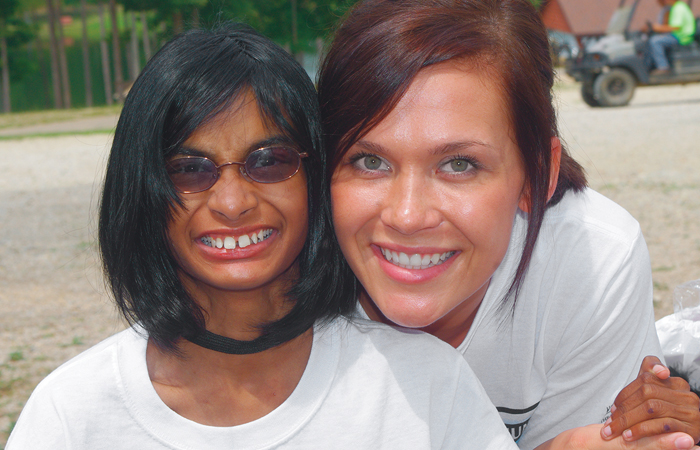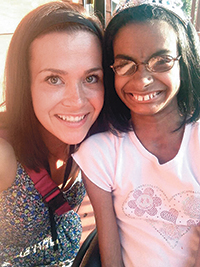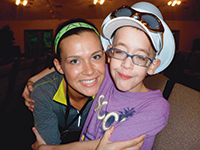
Camping Unlimited

Elizabeth Barrett gets as much as she gives as an MDA Summer Camp volunteer
There are so many noble reasons to be an MDA Summer Camp volunteer, and Elizabeth Barrett can easily chat up every last one. As a six-year veteran volunteer at the St. Louis-area MDA Summer Camp, now held annually at Pinecrest Camp in rural Madison County, she immediately launches into how MDA’s life-changing summer camps give kids with muscular dystrophy and related life-threatening diseases that limit muscle strength and mobility one blissful week when they can play and live unlimited in an environment without barriers. And without a moment’s hesitation, Barrett extols the virtues of MDA itself, an organization that she says “works so hard to help find a cure for muscular dystrophy, ALS and other muscle-debilitating diseases.”
Talk with her long enough, though, and Barrett begins to sound more like one of her happy campers. That’s when she gleefully turns to camp activities, from painting stage sets for a camp-wide talent show to painting her fingernails as part of a before-bed, girls-only gabfest. She’ll rave about the camp food, saying, “it’s incredible — plus there’s ice cream at every meal.” And with a giggle in her voice, she’ll dive into stories about swim time, her favorite camp activity. “Just look around the pool! All you see are smiling faces. How can anyone not love that? Nothing makes me happier than being a kid with the kids. It’s the best week of the year. I know everyone says that. I think you have to experience it to understand it.”

A healing experience
Barrett’s journey to MDA Summer Camp was bittersweet, as it began with her father’s ALS diagnosis in 2010. In 2011, at age 20, she put college on hold and returned home to share caregiving responsibilities with her mom. “We got a newsletter from our local St. Louis MDA talking about camp,” Barrett recalls. “Next thing I knew, I was interviewing to be a counselor and then brought on for the next summer session.”
More than a few naysayers challenged Barrett’s decision to volunteer. “A lot of people said that it would be detrimental to my sanity — since I was already caring for my dad. At the time, though, I saw a week at MDA Summer Camp as a break and maybe a chance to learn more about my dad’s disease. So I went. After only a day or two, I realized how therapeutic the whole experience was for me. The kids taught me to forgive the disease, and that helped me find so much more happiness during the time I had left with my father.”
After Barrett’s father lost his brave battle with ALS in 2013, her dedication to MDA Summer Camp only increased, recalls Therese Michalski Gabriel, co-director of the St. Louis-area MDA Summer Camp and family support & clinical care coordinator at MDA’s St. Louis office. “I think volunteering was an important part of Liz’s healing process. Nothing can diminish the loss of her father, but I do think Liz sees camp as something positive that came from tragedy. It was her dad’s disease that brought her here — someplace where she’s surrounded by people who understand these diseases and how they affect family, too.”
The greatest week … plus a lot of extras
In 2015, Barrett’s passionate attachment to MDA Summer Camp landed her a promotion to unit leader, which involves overseeing a group of counselors. “She really stepped up, sharing her own experiences with the newer volunteers,” says Gabriel. “Liz brings so much energy to the table.”
Gabriel quickly adds that Elizabeth also brings “fun extras” to the table — literally. “She set up a GoFundMe page last year to raise money for camp goodies, like whip cream for our sundaes and extra craft supplies. Liz raised $1,000 in a very short amount of time and funded a lot of extra fun last summer.”
Another “extra” that Barrett never expected was a new view on what’s really important to her. “Camp has given me a whole new outlook on life. I appreciate the small things so much more now,” she says.
Relax and enjoy life
Barrett credits MDA camper Bela, who has a form of neuromuscular disease coupled with learning challenges, as one of her most influential “teachers” when it comes to learning to value what can be done rather than fretting over what cannot be done. Bela, now 17, will attend MDA Summer Camp for her fifth and final time this summer, since 17 is the camper cutoff age.
“Bela was the first camper I was paired with, and I wasn’t prepared for how slowly she walks — because of her neuromuscular disease. That first summer with Bela, I kept wanting to put her in a wheelchair so we could go faster,” Barrett recalls. “Bela didn’t want that. She was perfectly capable of going where she wanted to go. I just had to be patient. Once I realized that, I slowed down — so Bela and I could enjoy life together instead of racing to the next activity. That was an awesome discovery for me; it changed my life.”
With this revelation came the freedom to kick back, enjoy camp and relax into the role of Bela’s “big sister,” which is how Bela’s mom, Vanessa Cook, refers to Barrett. “Elizabeth plays such an important role in Bela’s life,” Cook says. “My daughter is a very outgoing person — she enjoys anything that gives her independence, and Liz encourages Bela to be as independent as she wants to be.”
For instance, Barrett applauds Bela’s self-proclaimed love for dancing, singing and swimming, with the latter a particular accomplishment. “I can float on my back with no one holding me!” Bela gleefully shares. Cook agrees that these are all activities where her daughter shines, although Bela’s mom adds that it’s not only the activities Bela loves — it’s the whole package, including the people Bela dances, sings and swims with. “Bela and her camp girlfriends share a tight bond — like family. She feels the same about her counselors. We’re in touch with a lot of camp friends all year long. We just saw Elizabeth for Bela’s birthday party. They’re like sisters and that relationship means so much to my daughter.”
The ripple effect
During the six years since Barrett first signed on as an MDA Summer Camp counselor, she’s taken the reins and built a great life. Part of her happiness stems from a new career as a certified personal trainer, specializing in weight loss, total body conditioning and rehabilitative training. A large part of her professional success, Barrett says, springs from her experiences at MDA Summer Camp. “The campers helped me understand that every body is different, and certain bodies have certain limits. That made me a better personal trainer. I’m much more patient with my clients — more patient than I ever thought I could be.”
As Barrett talks about everything MDA Summer Camp gives her, she sometimes slips into a whispered apology. “It sounds so selfish when I talk about everything MDA camp gives me.” Bela would likely disagree that her friend has even one selfish bone in her body, since the mere mention of seeing Barrett again prompts a resounding “Yea!” Gabriel gets a little teary-eyed as she describes how “beautiful it is to watch Elizabeth tenderly care for the campers.” Perhaps the only answer is to call the MDA Summer Camp experience a draw, or better yet, a win for everyone involved.
Donna Shryer is a freelance writer in Chicago.

Care Package
As co-director of the St. Louis-area MDA Summer Camp and family support & clinical care coordinator at the St. Louis MDA office, a vital part of Theresen Michalski Gabriel’s job is to oversee camp volunteers. The group largely consists of millennials — that much-studied demographic that’s often dubbed the “Me Me Me Generation” due to its supposed self-focus. Just don’t mention this label to Gabriel.
“When people call these wonderful young adults the ‘Me Me Me Generation,’ I challenge them to come visit our camp,” she says. “Every day, I watch these millennials gently and carefully lift campers who can’t walk or selflessly skip their own lunch to feed campers who can’t lift a fork. Our volunteers are there for our kids 100 percent.”
It’s the same story across MDA’s nearly 75 weeklong summer camps — offered at no charge to families thanks to loyal, generous supporters who fund the camps as well as caring, empathetic volunteers who assume all camper care, including physical and emotional support. These camps give kids with limited muscle strength and mobility a life-changing experience in an environment without barriers and where anything is possible.
If seeing is believing, MDA Summer Camp gives volunteers just as many benefits, from a week filled with amazing adventures to lifelong friendships and a greater sense of independence. “We have a solid core of counselors who volunteer year after year,” Gabriel says. “They get together during the year, too. Camp gives our volunteers a chance to forge great relationships.”
To learn more about being an MDA Summer Camp volunteer as well as volunteering at MDA events in your area, go to mda.org and enter your ZIP code in the “Find MDA in Your Community” box. And, if you’d like to sign up to volunteer, go to the Ways to Get Involved section and submit the electronic form.
MDA Resource Center: We’re Here For You
Our trained specialists are here to provide one-on-one support for every part of your journey. Send a message below or call us at 1-833-ASK-MDA1 (1-833-275-6321). If you live outside the U.S., we may be able to connect you to muscular dystrophy groups in your area, but MDA programs are only available in the U.S.
Request Information